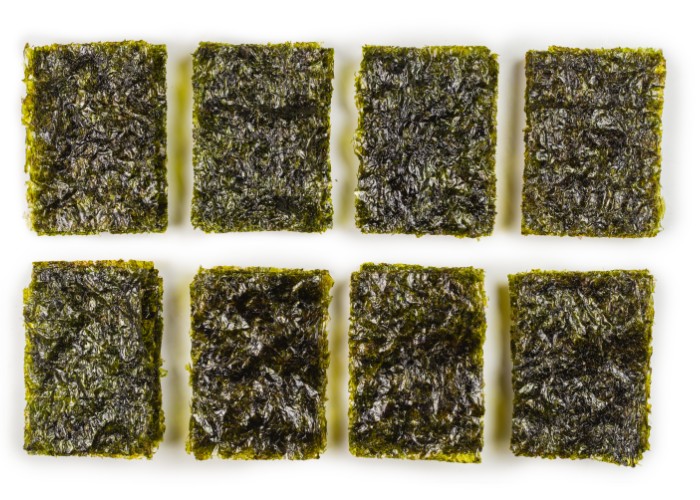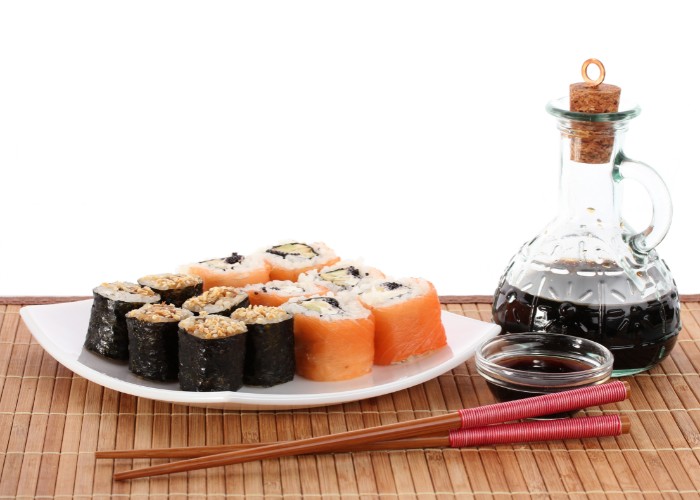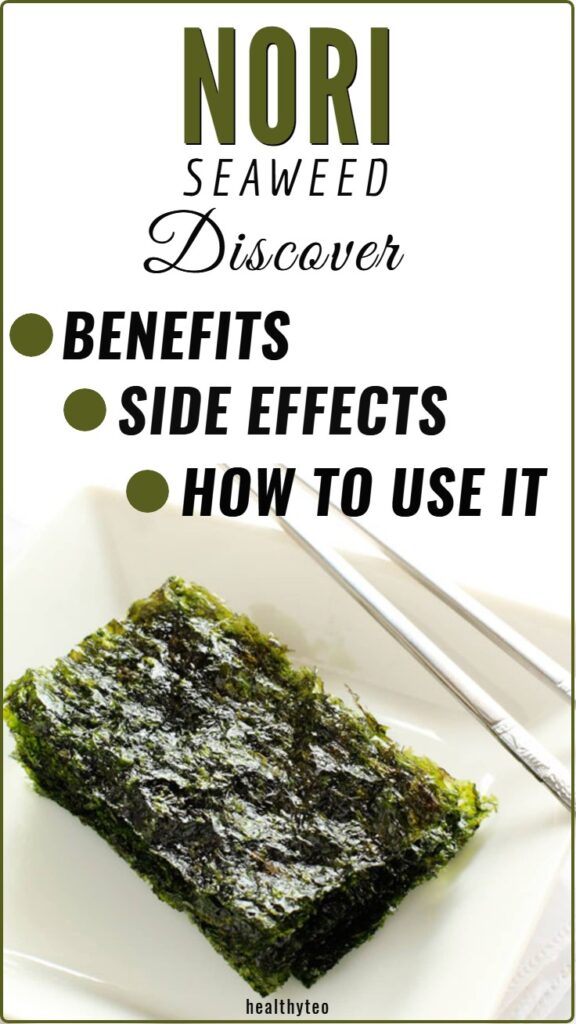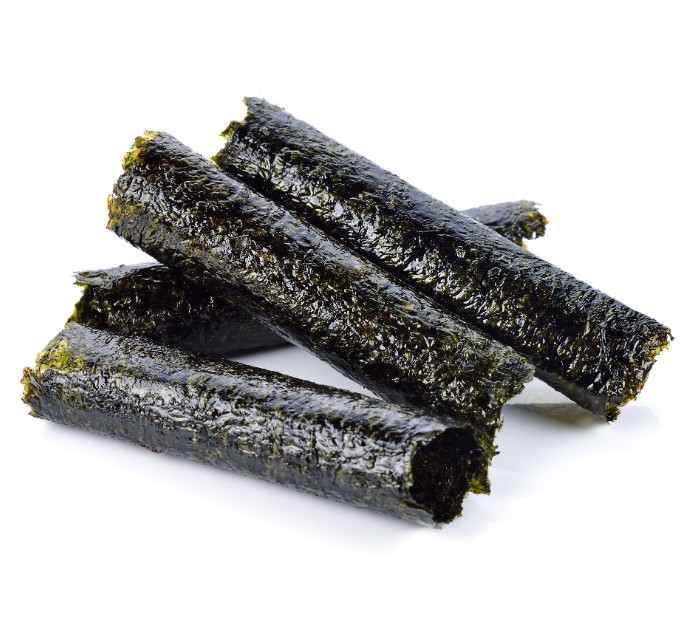Benefits and side effects of adding nori seaweed into your diet
Nori is an edible seaweed and in the US is a common ingredient in sushi dishes. Maybe you haven’t heard about nori because in the US it is also called laver.
Good thing is that you don’t need to be in a sushi restaurant to taste and enjoy the benefits of nori, you can use it in many dishes in your own kitchen.
If you haven’t tried nori and don’t know what is it, how it tastes, and how it can contribute to your diet read below we’ve covered all these topics for you.
This post may contain affiliate links, which means we may receive a small commission, at no cost to you, if you make a purchase through a link. For more information, please see our disclosure.
What is Nori?
Originally Nori is the Japanese term for edible seaweed. It is a sea vegetable, species of the red algae genus Porphyra. In the United States, some consumers call it “laver“, in Britain and Ireland “purple laver“, “kim” in Korea, and “zicai” in China.

It is a dark green, almost black seaweed, known to the whole world as the dried 7″ x 8″ sheet of processed edible red algae used to hold toppings in place or to wrap sushi rolls.
While most westerners use nori seaweed only in sushi rolls, the Japanese use this edible seaweed as a garnish or flavoring in noodle preparations and soups. It is also eaten by making it into a say sauce-flavored pasta and many seafood dishes.
How is made?
The seaweed is farmed in the sea where it grows on large nets suspended on the surface of the sea. When harvested it is first washed with fresh water and then fed into a shredding machine which reduces it to pieces about 5 x 1 cm in size.
The method of making nori sheets is similar to papermaking. Red algae are shredded to a paste-like texture and mixed with water. Then this paste-like texture is poured into frames and fed into a machine ( similar to a paper-making machine).
After drying the sheets are packed and sealed in cellophane quickly so the moisture will not reduce their quality. These dark green nori sheets are ready to be shipped all around the world.
Production of nori in Japan is a big deal. There are 230 square miles of the sea used in producing 350,000 tones whose value is said to be worth a billion dollars. Just imagine how much nori is this when one sheet of nori is 3 grams ( 0,11 oz ) in weight.
Good to know: Nori doesn’t have to be rehydrated before using like other types of dried seaweed, such as wakame and kombu.
Nutrition information
Even small amounts of nori contain one to four percent of most essential vitamins and minerals. Each ounce of nori seaweed has less than 10 calories and:
- 7% of the daily value (DV) for riboflavin (vitamin B2)
- 29% of the DV for vitamin A
- 10% of the DV for folate (vitamin B9)
- 14% of the DV for manganese
- 18% of the DV for vitamin C
Raw seaweed is 85% water, 5% carbohydrates, 6% protein, and has negligible fat.
Health benefits of nori seaweed
Let’s see why nori is good for you and what are the benefits of eating nori?
First, this seaweed helps you stay thin. A full sheet contains only four calories and it is about one-third of fiber. Protein comprises another third of each sheet of nori.
If you are vegetarian eating nori can help boost your protein intake without pilling on the calories. Rich with vitamins like vitamin A ( in 100 grams of fresh, raw nori there is 5202 IU or 104% of DV of vitamin A) and vitamin C ( in 100 grams 39 mg or 65% of DV of vitamin C) nori is a super nutritious food.
Let’s go further and see what are other benefits of eating nori.
Great dietary source of iodine
Western diets are typically low in iodine. The reason for this is that people are restricting their sodium intake in response to the dangers of consuming excess salt.
Another reason is consuming too much processed food. These processed foods contain a lot of poor quality salt (iodine-free).
If the consumption of iodine salt is reduced, people can easily become iodine deficient. Without sufficient levels of iodine, thyroid function can become impaired, meaning it is harder for your body to burn fat. The result of this is fatigue and weight gain.
That’s why it is important to add iodine-rich foods to our diet. Nori is an excellent source of iodine and adding it to your diet at least three times a week can help keep your thyroid in check.
The iodine content in nori varies from 16 -43 mcg/g or about 11-29% of the daily value. Recommended Dietary Allowances (RDAs) for iodine is 150 mcg per day, for men and women above 19 years.
Just 5 grams of nori is over 57% of your daily intake requirements. You can’t find a more concentrated source of iodine than you would in seaweed!
Of all seaweeds nori has the lowest average iodine content, other seaweeds are richer with iodine. Kombu has the highest 241-4921 mg/kg, then wakame 94-185 mg/kg and nori 29-45.8 mg/kg.
Remember that too much iodine is bad for your thyroid too. If you end up going over the recommended upper limit for adults of 1,100 mcg, that much iodine can cause thyroid dysfunction.
Contains unsaturated fatty acids
A chapter called Seaweeds for Food and Industrial Application from the book Food Industry says that nori seaweed is a rich source of unsaturated fatty acids with more than 10% of its total fatty acid content comprised of linolenic, linoleic arachidonic acids.
Eicosapentaenoic acid (EPA) is an omega-3 fatty acid and takes 50% of the fatty acids in nori. Scientists from this study say that EPA is more effective in preventing atherosclerosis than arachidonic acid.
Unsaturated fats are an important part of the diet. These fats help reduce the risk of heart diseases and lower cholesterol levels.
Good to know: A single sheet of nori contains more omega-3 fatty acids than a cup of chopped avocado.
The best source of vitamin B12
Nori contains good amounts of many B-complex vitamins such as vitamin B-6 (pyridoxine) – 12% of RDA, B-2 (riboflavin) – 34% of RDA, B-9 (folate) – 39% of RDA, thiamin and niacin.
When it comes to vegans and vegetarians their biggest problem is consuming foods high in vitamin B12. The main source of this vitamin is animal products like meat and eggs.
B12 is so important for many processes in our body, such as helping make DNA and red blood cells, helps keep your brain and immune system healthy, and plays a role in preventing a type of anemia called megaloblastic anemia, which may leave you tired and weak.
Now when we see that vitamin B12 is so important for our health, what is the best source of this vitamin for vegans and vegetarians? Well, nori seaweed of course.
According to a study published in 2014 “To prevent Vitamin B12 deficiency in high-risk populations such as vegetarians, it is necessary to identify plant-derived foods that contain high levels of Vitamin B12”.
Dried purple laver (nori) is the most suitable source of vitamin B12 presently available for vegetarians.
The same study says that consumption of approximately 4 g of dried purple laver (nori) ( vitamin B12 content: 77mcg/100 g dry weight) supplies the RDA of 2.4 mcg/day.
We can make a conclusion from this that you don’t have to eat a lot of nori to get an adequate amount of vitamin B12.
Rich source of amino acids
Taurine, alanine, glutamic acid, and aspartic acid were detected in a study about free amino acids in dried nori. Why do we mention these amino acids? Because they are beneficial in several ways.
Let’s mention some of these: Taurine is an amino sulfonic acid and it is not used to build proteins. It is classified as an essential amino acid. Your body can produce taurine, and it is also found in some foods like laver (nori).
It may improve blood sugar control, may help reduce your risk of cardiovascular disease, and also taurine may boost exercise performance.
Glutamic acid and alanine are known to be important free amino acids for the taste of nori.
Large amount of essential trace minerals
Another benefit of eating nori is that this seaweed contains quite a large amount of trace elements including zinc, manganese, iron, selenium, and copper.
Why these elements are important?
Upward of 300 enzymatic processes in the human body rely on zinc. Zinc is critical for DNA and RNA synthesis, protein metabolism, alcohol metabolism, antioxidant and immune function, and maintaining acid/base balance in the body.
RDA of zinc depends on age and gender. For males, over 19 years RDA is 11 mg/day, and females over 19 years are 8 mg/day. When it comes to nori in 100 grams nori there is 1.05 mg of zinc or 7% of DV.
Side effects of eating nori seaweed
As all foods nori is safe to eat if it is consumed in moderate amounts. Excessive consumption of nori may have hazardous side effects.
Source of DHA (type of omega-3 fatty acid)
DHA or docosahexaenoic acid is found in seafood products like salmon, sardines, tuna, and seaweeds too. Nori is not an exception.
There is nothing bad about this acid. Contrary NIH says that omega-3 fatty acids like DHA promote proper development of the nervous system and are good for brain health and vision too.
Why do we mention this in the side effects of nori? NIH reports that this acid (DHA) may interact with certain blood pressure medications, and reduce blood pressure by enhancing the effects of prescription blood pressure medications.
So people who are taking these medications should consult a doctor first before consuming nori seaweed.
Sodium content in nori
According to the Harvard School of Public Health, the human body requires a small amount of sodium to conduct nerve impulses, contract and relax muscles, and maintain a proper balance of water and minerals.
It is estimated that we need about 500 mg of sodium daily, but most Americans consume at least 1.5 teaspoons of salt every day, or about 3400 mg of sodium, which contains far more than our bodies need.
One sheet of nori (2.5 grams) contains 3 mg of sodium. Now you think this is an insignificant amount, but some flavored nori sheets contain additional sodium.
Individuals on a low-sodium diet should restrict sodium intake. Even nori contains an insignificant amount of sodium when eating in Japanese restaurants and order nori with soy sauce where there is additional salt for flavoring, sodium can easily accumulate very quickly among the nori.
So, if you need to be careful with sodium intake it is good to know that nori contains sodium even in small amounts.
How to incorporate nori into your diet

There are many ways that you can eat and enjoy nori. Here are a few suggestions:
- Nori as a snack
It is a great choice to make as a take-to-work snack and a better choice than other salty snacks. The crispy texture makes it appealing to kids too.
- Smoothies
Powdered nori is a great natural protein source. Use one teaspoon of the powdered seaweed to add to your favorite smoothie.
- Use it in soups, stocks and stews
You can add it to soups or stews but it is best to take out the solid nori stripe before serving. But when it comes to miso-soup it’s essential to leave the nori in as that’s what gives it typical flavor.
- Seaweed salad and salad dressing
You can make delicious nori salad with spring onions, garlic, vinegar, and other vegetables. Powdered nori can also be used as a salad dressing. Just allow it to sit for a few moments to absorb before use.
- Nori for sushi
Nori is mostly known for its use to make sushi. If you don’t know how to make it at home just order from your favorite sushi restaurant.
Where to buy nori
It is hard to find good quality nori at your local store. The best place to pick it up is at your local Japanese grocery store. Choose sheets that are shiny and have a firm texture and green hue when exposed to the bright light.
The best quality nori is jet black in color and has an even, uniform thickness throughout. Premium nori has a subtle flavor and natural sweetness, with no noticeable off-flavors. This seaweed should be crisp out of the bag and yet it has a softness that melts in your mouth.
If you can’t find it in your area just simply order it online. You can do that here via Amazon, and if you buy these raw organic nori sheets you get a free sushi roller mat!
Common questions and answers
Japanese Yaki-Nori is considered to be vegan, as seaweed is the only listed ingredient. Another type Aji-Tsuke Nori is flavored can have crab, shrimp, and other flavorings, so would not be suitable for a vegan diet. Korean Nori labeled as flavored is fried with salt and it is also vegan.
It is difficult to determine how much seaweed people should consume daily. Just 5 grams of nori is over 57% of your daily requirements.
Because all seaweeds contain iodine, nori is also rich in iodine. We must mention that nori has the lowest levels of iodine from all seaweeds. if you consume seaweed in large quantities every day you will consume large quantities of iodine and this can have a negative effect on your thyroid health.
Any seaweed including nori is considered naturally low FODMAP.
Nori is a significant source of iodine. The risk of taking in too much iodine is relatively small, but it would always be good to consult with your doctor first before adding nori to your diet.

Final thoughts about nori (laver) seaweed and the benefits of eating it
Nori seaweed is great food especially for vegans and vegetarians because it is rich in vitamin B12 and all other B-complex vitamins. This fact is important for vegetarians but the list of benefits of nori seaweed is long.
Rich in iodine, vitamins, and minerals, unsaturated fatty acids nori is not just food that you consume in Japanese restaurants when you eat sushi. You should try it at home and use it in salads, soups, salad dressings, smoothies, and other dishes.
The flavor can boost a variety of recipes, the nutrient content is great for a healthy diet.
Be careful if you have some thyroid problems or taking any thyroid medications you should talk to your doctor first before adding nori to your diet.
Related articles with benefits of eating nori seaweed
- Benefits Of Wakame Seaweed And How To Use It
- Kombu Seaweed: Powerful Sea Food – Benefits and Side Effects
- Benefits of Eating Dulse Seaweed – Secret Sea Vegetable
- Sea Moss: Benefits and Side Effects That You Should Know
- Different Types Of Seaweed To Eat-How To Use Sea Vegetables




